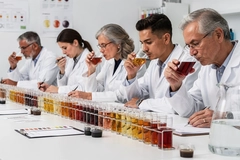
- Industry news
Industry news
- Category news
Category news
- Reports
- Key trends
- Multimedia
- Journal
- Events
- Suppliers
- Home
- Industry news
Industry news
- Category news
Category news
- Reports
- Key trends
- Multimedia
- Events
- Suppliers
Animal Health Agreement Tops European Agenda

02 Jun 2015 --- European Parliament and the Council have reached a political agreement on the animal health proposal in the ordinary legislative procedure. The agreement is based on the June 2013 proposal for a single, comprehensive animal health law to replace the complicated animal health rules currently in place.
• The huge number of legal acts relating to animal health would be streamlined into a single law.
• Simpler and clearer rules would free up time, enabling authorities and those having to follow the rules to focus on key priorities: preventing and eradicating disease.
• Responsibilities would be clarified for farms, vets and others dealing with animals.
• The new rules would allow greater use of new technologies for animal health activities - surveillance of pathogens, electronic identification and registration of animals.

• Better early detection & control of animal diseases, including emerging diseases linked to climate change, would help the EU meet with international standards.
• There would be more flexibility to adjust rules to local circumstances, and to emerging issues such as climate and social change.
Commissioner for Health and Food Safety Vytenis Andriukaitis welcomed the political agreement: "I congratulate the European Parliament and the Council on reaching a political agreement on the animal health proposal,” he said. “Farming is an important industry for the European economy, both in terms of jobs and economic output. This agreement paves the way for a more efficient and streamlined system to combat transmissible animal diseases, like foot and mouth, bluetongue, avian influenza, or newly emerging diseases. These diseases could potentially have devastating impacts not only for human and animal health, but also for our agriculture or aquaculture production.”
“The principle "Prevention is better than cure" is at the heart of the regulatory environment that this agreement provides,” he said.
“Good animal health is a key contributor to sustainable agriculture and aquaculture production and is vital for our competitiveness in international markets. However, it is a shared responsibility. Since animal diseases do not respect borders, uniform rules and cooperation between EU countries have been, and remain, essential for effective prevention, surveillance, notification and eradication of animal diseases. These are also in line with our "one health" policy approach to safeguard animal health and its link to human health, as well as with international standards.”
He continued: “Today's political agreement meets the need to modernise and simplify the current system to protect the health of Europe's animals by clarifying the division of responsibilities between animal keepers, traders, veterinarians, and national authorities. It puts in place better notification and surveillance tools to fight animal diseases, which in turn should lead to fewer epidemics in EU countries. It also recognises the importance of the recent emerging issues, such as antimicrobial resistance or biodiversity. The new rules will allow for improved early warning, detection and control of animal diseases. Operators will also benefit from more proportionate rules easing animal movements where lower risks permit so, and also from greater use of new technologies such as electronic identification and registration of animals or electronic certification.”
Andriukaitis concluded, “I extend my thanks to both the European Parliament and the Latvian Presidency for finding common ground. This agreement will allow us to improve our response to animal disease outbreaks, ensure that economic impacts of disease outbreaks are lessened and will provide for a framework to keep the EU’s internal market of animals and animal products both safe and smooth."










